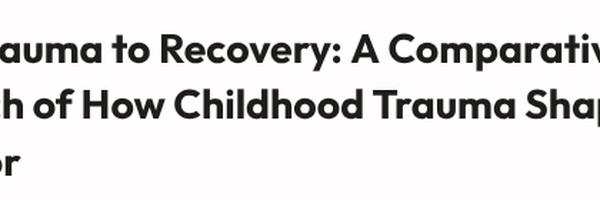From Trauma to Recovery: A Comparative Research of How Childhood Trauma Shapes Adult Behavior
Grade 8
Presentation
Problem
Our problem was "How does childhood trauma affect adult behavior?" we wanted to research this topic to understand how grave the outcome of childhood trauma is, and to see if it is a reason for different adults to act abnormally.
Method
Here is the method we used to conduct our research:
- Identified key topics: childhood trauma and its effect on adults.
- Searched reliable sources: academic databases and trusted websites.
- Selected studies based on relevance and reliability.
- Summarized findings concerning the impact of childhood trauma on adult behavior.
- Examined treatment options that may help adults cope with childhood trauma.
Research
For our research we looked at the four main outcomes for childhood trauma.
Emotional Dysregulation
Emotional dysregulation, or difficulty controlling negative emotions, is often caused by trauma (National Library of Medicine).Emotions can be managed consciously and unconsciously, but trauma makes this harder.
Trauma is linked to:
- Higher cortisol levels
- Poor emotional control
- Reactive aggression
- Children who experience trauma are more likely to:
- Struggle with emotions
- Show aggression
- Face anxiety, depression, and focus issues
- Also, A long-term study of 1,420 people found that:
- 40% experienced one traumatic event
- 23% experienced two
15% experienced three or more
Trust Issues
Psych Central states that, as children, we rely on caregivers for safety, comfort, and emotional guidance. Caregivers help us understand right from wrong and process our feelings.When caregivers fail to provide support, we may struggle to trust others and ourselves. In adulthood, this can show up as:
- Trouble trusting partners
- Fear of sharing ideas at work
- Becoming overly focused on pleasing others
These patterns often stem from emotionally unavailable caregivers during childhood
Internal Struggles
Psychology Today highlights that childhood trauma can lead to deep internal struggles in adulthood.
Early trauma often disrupts self-confidence and emotional balance. In adulthood, this can show up as:
- Constant feelings of guilt or shame
- Chronic self-doubt and low self-esteem
- Difficulty identifying or expressing emotions
- Feeling disconnected or numb
Reactive Aggression
These patterns arise when early experiences teach individuals to turn inward, battling unseen emotional wounds.
Healthline explains that childhood trauma can lead to reactive aggression in adulthood.Early trauma raises cortisol levels, keeping the brain in a constant state of stress.
In adulthood, this can show up as:
- Quick, intense anger in stressful situations
- Difficulty controlling frustration or impulsive reactions
- Feeling constantly on edge or easily provoked
- Struggling to de-escalate conflicts
These patterns often develop when the brain learns to respond defensively, mistaking minor stressors for threats.
Data
For our data, we made a bar graph from 5 different studies that looked at how childhood trauma affects adult behavior.
Impact of Childhood Trauma:
Bar Graph Data Analysis
- Chapman et al. (2004): Linked trauma to depressive disorders.
- Lu et al. (2008): Found links to high-risk behaviors and PTSD.
- Yen et al. (2002): Focused on personality disorders.
- Golier et al. (2003): Showed trauma’s connection to PTSD and paranoid personality disorder.
- Van Dijke et al. (2012): Found trauma caused emotional dysregulation.
Each study focused on different impacts of childhood trauma, from depression to personality disorders and PTSD.
Conclusion
In conclusion, our research confirms that childhood trauma has lasting effects into adulthood. Studies consistently link early trauma to higher risks of depression, personality disorders, PTSD, and emotional dysregulation. These findings highlight the need for early intervention and mental health support to minimize long-term impacts.
Citations
A problem could have been self-reporting bias. This bias may make the results less reliable as the answers given may have been potentially influenced by memory, honesty, or emotional state at the time of the reporting.
Acknowledgement
We would like to acknowledge everyone that helped us on this project such as our Teachers, (Miss Bennaucer) and (Miss Khalil) thank you so much for providing us some time to work on this project and providing insightful advice. We would also like to thank our parents–thank you so much for helping us stay motivated and supporting us. Finally, we appreciate the resources and research materials that helped us understand the impact of childhood trauma on adults, along with the various treatment options available.

